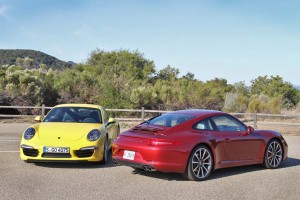Automakers are intent on entering the connected world, loading their latest vehicles up with high-tech features such as 4G WiFi hotspots, voice-operated navigation, and even infotainment systems that can read out Facebook posts. But while these may appeal to young, tech-savvy shoppers, other buyers question the benefits, according to a new report by J.D. Power and Associates.
The quality consultancy’s latest APEAL study finds that, on the whole, car buyers are slightly less pleased with the new cars, trucks and crossovers they are being offered this year. But the survey of recent buyers did find gains in owner satisfaction when it comes to improvements in vehicle fuel economy. Buyers are much more ambiguous about high-tech additions to their new vehicles.
Porsche was the highest-ranked brand in the latest study, while Hyundai delivered a surprise by landing the top spot among mainstream brands.
“Manufacturers often look to new features and technologies to keep their vehicles fresh and attractive, but designing systems that consumers find intuitive and easy to use has been a challenge,” said Power Vice President Renee Stephens.
The findings of the latest APEAL study – short for Automotive Performance Execution and Layout – echoes the results of the 2014 J.D. Power Initial Quality Survey, or IQS. That report actually saw a decline in automotive quality this year. The reliability of traditional mechanical components, such as engines and transmissions, actually improved, but new vehicle owners reported a growing number of “problems” with their navigation and infotainment systems.
(Auto quality slides in latest J.D. Power IQS. Click Here for more.)
The IQS focuses solely on what industry types like to call “things gone wrong.” The APEAL study, however, also measures “things gone right,” those things that enhance an owner’s appreciation of a vehicle. And the latest report finds that motorists are particularly pleased by the rapid gains the industry has been making in delivering better fuel economy.
They’re also excited by improvements to automotive interiors. That’s become a competitive industry battleground, even economy cars outfitted with the sort of soft-touch fabrics and chrome and wood-like trim that once was a hallmark of much more upscale vehicles.
But, on the whole, the trend was downward this year in the APEAL study, which covers 77 different vehicle attributes, using a 1,000-point scale.
The average score was 794, down 1 point from the 2013 study. Fuel economy was the only notable improvement, up 6 points.
“Owner-reported average mpg also improves to 25.0 mpg from 24.5 in 2013, resulting in more favorable perceptions of both driving range and mileage,” noted a summary of the 2014 APEAL study results.
(Lincoln lands lead in latest Vehicle Satisfaction Awards. Click Here for more.)
Porsche dominated the study for the tenth years in a row, scoring 882 points, 20 more than second-ranked Jaguar. Audi, Land Rover and BMW rounded out the Top Five with almost identical scores. Not surprisingly, feature-laden luxury brands dominated the APEAL chart.
Hyundai came in 13th among the 32 brands included in the report, with a score of 804. It was, nonetheless, the highest-ranked mainstream brand. And, perhaps more significantly, it was also the top mainstream marque in the J.D. Power IQS study released last month. That means that Hyundai is leading mid-range rivals such as Ford, Toyota and Volkswagen when it comes to both things-gone wrong and things-gone-right.
The industry average was a score of 794.
Mitsubishi and Jeep sat at the back of the pack, much as they did in the IQS study. One of the surprises, however, was the poor performance of Subaru, with a score of just 766. The small Japanese maker has posted some of the biggest sales gains of any brand in recent years, largely driven by intense owner loyalty, analysts note.
Porsche products, including the 911, Boxster and Cayenne, received three awards as their respective segment leaders. But Dodge also captured three segment leads for its Challenger, Charger and Dart models.
Audi, Ford, Mercedes-Benz and Nissan led in two segments. Other segment winners included Audi, GMC, Honda, Hyundai, Kia, Land Rover, Mazda, Mini, Toyota and VW.


Not only is all of this infotainment crap a driver distraction, it’s complicated to operate while driving meaning longer periods of driver distraction. When the electronics fails and it does, the repair costs are astronomical.